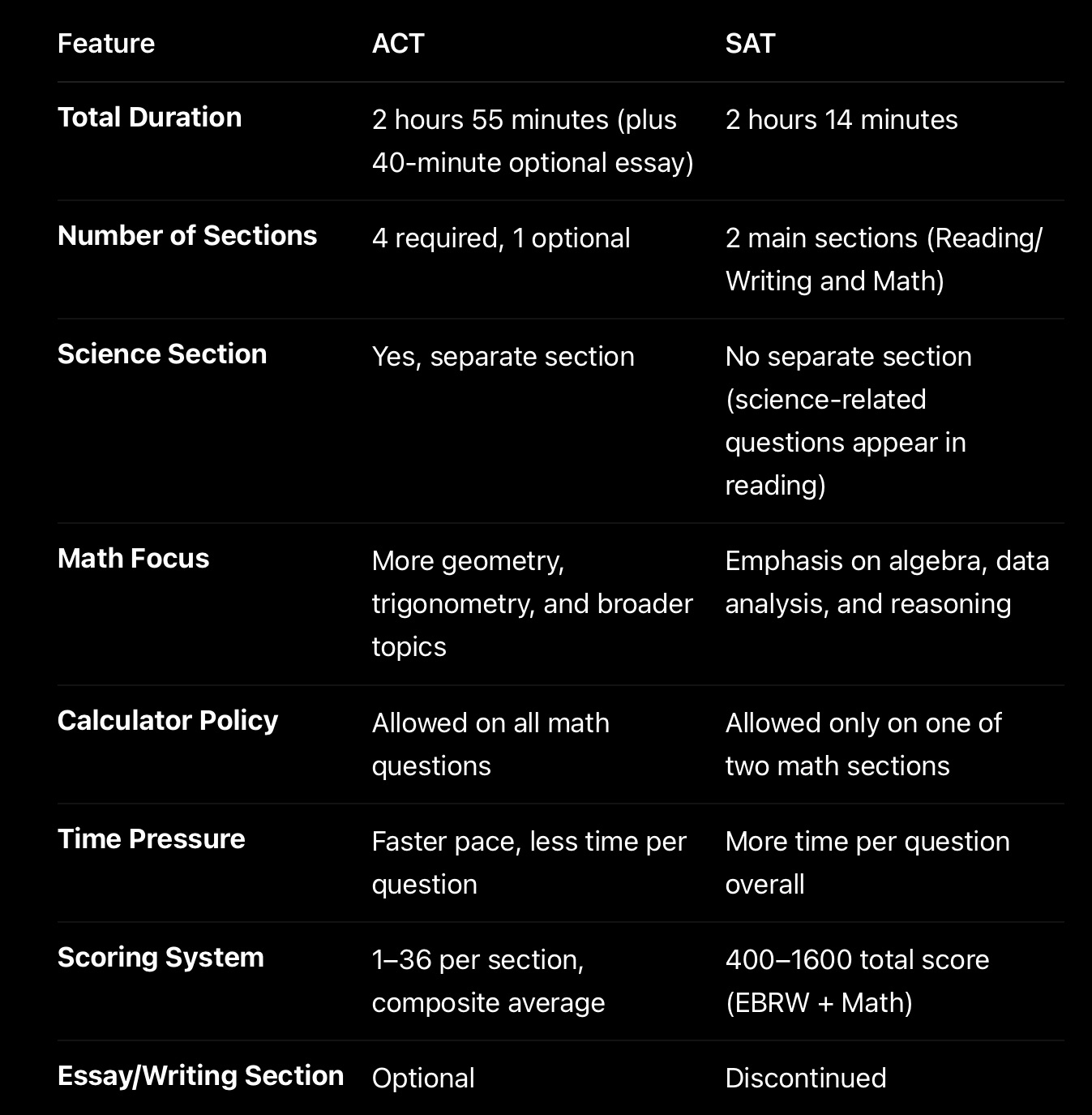Choosing Between the ACT and SAT: Everything You Need to Know
Ivy Brothers •
Choosing Between the ACT and SAT: Everything You Need to Know
For high school students preparing to apply to college, deciding whether to take the ACT or SAT is a crucial step in the admissions process. These standardized tests are designed to assess a student’s academic readiness for college and are accepted by virtually all four-year colleges and universities in the United States. While both exams serve a similar purpose, they differ in format, content, and testing style. Understanding these differences and knowing how each test aligns with your strengths can help you make a confident, informed choice.
In this guide, we’ll explore the structure of each exam, compare the key differences, offer advice on how to decide which test is right for you, and provide practical preparation tips.
Overview of the ACT and SAT
Before choosing between the ACT and SAT, it’s important to understand what each test entails:
The ACT
The ACT, administered by ACT, Inc., is a multiple-choice test consisting of four required sections:
1. English – Tests grammar, punctuation, sentence structure, and rhetorical skills.
2. Math – Covers algebra, geometry, and trigonometry.
3. Reading – Assesses reading comprehension across various genres.
4. Science – Measures interpretation, analysis, and problem-solving in natural sciences.
5. Optional Essay – A 40-minute writing test that analyzes a complex issue.
The ACT is scored on a scale of 1 to 36 for each section, with a composite score that is the average of the four required sections.
The SAT
The SAT, developed by the College Board, consists of two main sections:
1. Evidence-Based Reading and Writing (EBRW)
• Reading: Tests reading comprehension and evidence-based analysis.
• Writing and Language: Focuses on grammar, usage, and editing.
2. Math
• Split into two parts: one that allows a calculator and one that does not.
The SAT no longer includes an optional essay as of 2021. The test is scored on a scale of 400 to 1600, combining scores from the EBRW and Math sections.
Detailed Comparison: ACT vs. SAT
Which Test Is Right for You?
There’s no one-size-fits-all answer. The right choice depends on your strengths, preferences, and college goals. Here are some key factors to consider:
1. Test-Taking Speed and Endurance
The ACT is more fast-paced, with less time per question across all sections. If you’re good at moving quickly and staying focused under time pressure, the ACT might be a better fit. The SAT allows slightly more time per question, which may help students who prefer to work at a steady, thoughtful pace.
2. Math Strengths
The ACT covers a wider range of math topics, including more advanced algebra and trigonometry. If you’re confident in these areas, the ACT may be the better choice. The SAT’s math is more focused on algebra and data analysis, and it includes a section where calculators aren’t allowed. If you prefer fewer complex topics and are good at mental math, the SAT may suit you.
3. Reading and Science Skills
• Reading: SAT reading passages tend to be longer and require close attention to detail and evidence. ACT reading is more direct but faster-paced.
• Science: Only the ACT includes a dedicated science section, which tests your ability to analyze data and interpret graphs and experiments. You don’t need to memorize science facts — it’s more about critical thinking and data literacy.
4. Writing
If writing is a strong suit and you want to showcase it, the ACT’s optional essay could be an opportunity — especially for schools that still consider writing samples. However, most colleges no longer require it.
5. Superscoring and College Preferences
Many colleges now superscore, meaning they take your best section scores from multiple test dates. This practice is more common with the SAT, but it’s increasingly used with the ACT too. Check with the colleges you’re applying to for their specific policy.
How to Decide: ACT or SAT?
Step 1: Take Practice Tests
One of the most effective ways to choose is to take a full-length practice test for both the ACT and SAT under timed conditions. Compare your scores and assess how you felt during each exam — which one felt more intuitive or manageable?
Step 2: Compare Score Conversions
You can use concordance tables (provided by ACT and College Board) to compare your ACT and SAT scores side by side. This helps determine which test might give you a scoring advantage.
Step 3: Consider Accessibility and Test Dates
Check the testing calendar to see which test fits better with your schedule. Availability may also depend on your location.
Step 4: Think Strategically
If you’re applying to a school that emphasizes one test, or if a scholarship opportunity requires a specific test score, that may influence your decision.
Test Preparation Tips
Once you’ve chosen a test, here’s how to prepare effectively:
• Start Early: Give yourself at least 2–3 months to prepare.
• Use Official Materials: Practice with real test questions from ACT.org or CollegeBoard.org.
• Take Timed Practice Tests: Simulate test-day conditions to build stamina and identify timing issues.
• Focus on Weak Areas: Use results from practice tests to guide your study plan.
• Consider a Prep Course or Tutor: For personalized support, especially if you’re targeting top scores.
Final Thoughts
The ACT and SAT are both valuable tools in your college application journey, but they are not the only part of your story. Your GPA, coursework, extracurriculars, essays, and recommendations all contribute to your overall application.
Choosing between the ACT and SAT is about finding the test that aligns best with your academic strengths, your testing style, and your college goals. With research, practice, and preparation, you can make the right choice — and put your best foot forward in the admissions process.
Remember: You’re not locked in once you choose. Many students take both tests and send only their best scores. Explore your options, prepare with purpose, and trust in your ability to succeed — whichever path you choose.
Visit our website: www.theivybrothers.com
Schedule a consultation: https://tally.so/r/3Edv7
See More Posts
Ivy Brothers
Copyright © 2021 Ivy Brothers, Inc. All rights reserved.
Company
hello@theivybrothers.com




